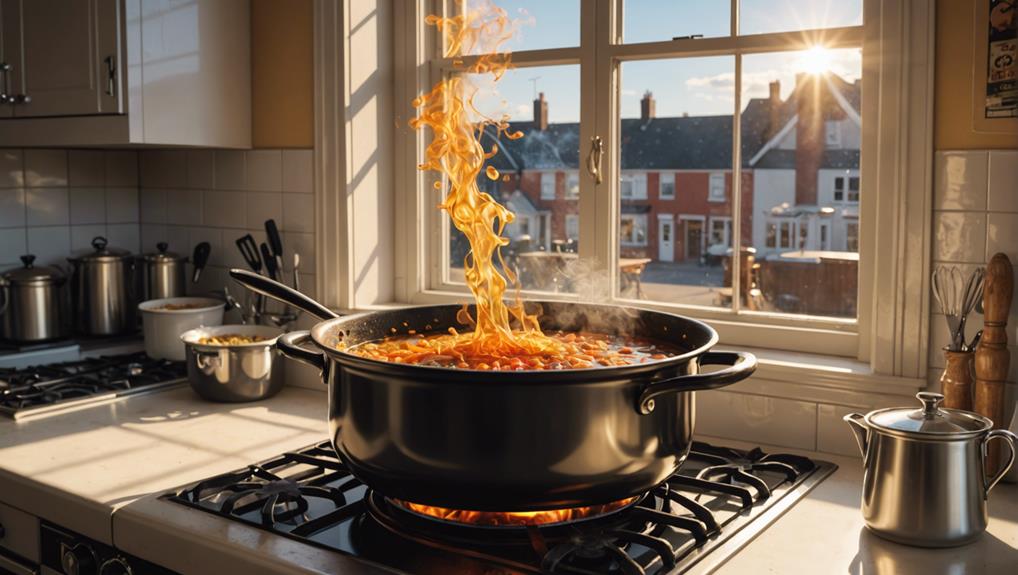Sure, you can boil vinegar, but brace yourself for some fumes that could knock you into next week. Vinegar's mostly water with some acetic acid, and when you boil it, that acid sticks around, getting all intense and ready to sting your nostrils. It might make your kitchen smell like a pickle factory under siege, so keep those windows open! It's great for ramping up flavors in recipes or tackling tough cleaning jobs, but the fumes can be harsh on your lungs and eyes. Wondering how to harness its powers without the gas mask? Stick around to find out!
Main Points
- Boiling vinegar increases the concentration of acetic acid, making it more potent.
- Boiling vinegar releases toxic fumes that can irritate the respiratory system.
- Enhanced acetic acid from boiling vinegar improves its cleaning power.
- Proper ventilation is crucial when boiling vinegar to avoid inhaling harmful vapors.
- Diluting vinegar with water before boiling can reduce the intensity of fumes.
Understanding Vinegar Composition
Understanding vinegar composition is crucial because it directly affects how you can safely and effectively use it. Vinegar, my friend, is more than just that pungent liquid you splash on your fries. It's typically composed of 4-5% acetic acid diluted in water. This humble acetic acid is the real MVP, responsible for vinegar's cleaning power and versatility. Think of it as the superhero in disguise, ready to tackle grime and bacteria like a pro.
Now, before you get all excited and start boiling vinegar to see what happens, you need to understand its composition. Acetic acid might sound like something concocted in a mad scientist's lab, but it's actually what gives vinegar its kick. It's the reason why vinegar can clean your windows, unclog your drains, and even act as a weed killer.
But hey, don't let its usefulness fool you; it's also potent enough to sting your nostrils.
Chemical Changes When Boiled
When you boil vinegar, the heat causes water to evaporate, which increases the concentration of acetic acid. Imagine your vinegar getting more intense like your favorite drama series. The more water that evaporates, the sharper and more pungent that vinegar becomes. It's like turning the volume up on your favorite song until the neighbors start complaining.
Boiling vinegar isn't just a chemistry experiment gone wild; it's also a culinary trick. You can use it to concentrate flavors, making your dishes pop like fireworks on the Fourth of July. But, be warned, it's not all rainbows and butterflies. The acetic acid vapors released can be pretty harsh on the nose. Think of it like cutting onions but with a bit more zing.
The taste and aroma of vinegar change too, getting more intense and sometimes even a bit too much. It's like turning a regular coffee into a triple espresso. Great if you need a kick, but maybe not what you want every morning.
Health Risks of Boiling Vinegar
You might think boiling vinegar is no big deal, but guess what? It releases toxic fumes that can turn your kitchen into a gas chamber, making your eyes water like you've just watched the saddest movie ever.
If you want to avoid coughing up a lung and irritating every inch of your respiratory system, maybe keep the vinegar out of the pot, okay?
Toxic Fume Release
Boiling vinegar releases harmful acetic acid vapors that can irritate your respiratory system and pose significant health risks. Yeah, boiling vinegar sounds like a great idea until you realize you're basically creating a mini toxic gas chamber in your kitchen. Not exactly the freedom you were dreaming of, right? Here's why you might want to think twice before turning up the heat:
- Headaches: Those acetic acid vapors can give you a pounding headache faster than your annoying neighbor's drum practice.
- Throat Irritation: Ever try talking after inhaling vinegar fumes? It's like gargling with sandpaper.
- Respiratory Issues: Breathing in those fumes might make you feel like you've been chain-smoking for years. Not fun.
- Eye Protection Needed: Vinegar vapors can sting your eyes, making you look like you just watched a tear-jerking movie marathon.
Respiratory System Irritation
Breathing in acetic acid vapors from boiling vinegar can lead to severe respiratory system irritation. Yep, that's right, folks. You might think boiling vinegar is just a harmless kitchen experiment, but it can turn your lungs into a battlefield.
Imagine coughing like you're auditioning for a horror movie, your throat feeling like it's been sandblasted, and breathing becoming as tricky as solving a Rubik's Cube blindfolded. Not exactly the freedom you were hoping for, huh?
But don't worry. If you still want to wield your vinegar-boiling powers, there are ways to keep your respiratory system from staging a revolt. Start by diluting that vinegar with water. It'll make the vapors less intense, kind of like turning down the volume on your annoying neighbor's late-night karaoke session.
And for the love of all things breathable, make sure your space is well-ventilated. Open a window, turn on a fan, or even better, boil it outside where the vapor can just float away like a bad dream.
Lastly, if you're feeling extra cautious, slap on some protective gear. Think of it like a superhero suit, but instead of fighting crime, you're fighting the nasties in the air. Stay safe, freedom lover!
Eye and Skin Irritation
Beyond wreaking havoc on your respiratory system, acetic acid vapors from boiling vinegar can also cause significant eye and skin irritation. Imagine wanting to do a harmless kitchen experiment and ending up feeling like you just walked through a cloud of angry bees. Yeah, it's not fun. Those vapors can sting your eyes and make your skin feel like it's on fire.
Here's what happens when you're too close to the action:
- Eye Irritation:
Your eyes start watering like you're watching a sad movie, but there's no popcorn, just pain.
- Skin Irritation:
Your skin might itch or burn—think of it as an unwanted spa treatment from hell.
- Safety Precautions:
Wear gloves and goggles. Seriously, you're not in a sci-fi movie, but you'll need the gear.
- Child Safety:
Keep the kiddos far away. They don't need to experience this mini-disaster.
Effects on Cleaning Properties
Alright, so you're thinking about boiling vinegar to supercharge your cleaning game. When you boil it, the acetic acid gets more concentrated, making it a stain-fighting ninja.
Just remember, while it's kicking grime's butt, you might want to crack a window unless you enjoy feeling like you're in a pickle factory.
Chemical Composition Change
Boiling vinegar increases the concentration of acetic acid, which enhances its cleaning power. When you boil vinegar, the water evaporates, leaving you with a more potent solution. This means when you tackle that nasty stovetop grease, you're armed with a stronger weapon. Think of it as bringing a bazooka to a water gun fight.
Here's what happens when you boil vinegar:
- Increased Acidity: The pH level drops, making the vinegar more acidic and potent.
- Sharper Smell: Be prepared for a stronger, more pungent aroma that'll clear your sinuses.
- Enhanced Cleaning Power: With more acetic acid, it slices through grime like a hot knife through butter.
- Chemical Composition Change: The higher acid content kicks up its effectiveness a notch.
Enhanced Stain Removal
By heating vinegar, you significantly boost its ability to tackle tough stains and grime. Picture this: you've got that stubborn rust on your sink or those annoying hard water stains that just won't quit. Boiling vinegar turns it into a cleaning superhero, ready to save the day.
When you boil vinegar, you're not just making some funky-smelling potion; you're actually increasing its acidity and concentration. That extra punch helps break down even the most stubborn dirt and grime. It's like giving your vinegar a turbo boost. And let's be honest, who doesn't want a turbo-charged cleaner in their home?
Boiling vinegar releases acetic acid vapors that work like tiny, invisible cleaning ninjas, dissolving and loosening dirt and debris. It's especially killer for those pesky mineral deposits and tarnish spots that seem to laugh at your regular cleaners.
Odor Neutralization Efficiency
Heating vinegar significantly boosts its ability to neutralize odors by dispersing acetic acid vapors more effectively. When you boil vinegar, you're basically sending those odor-fighting vapors on a mission to seek and destroy unpleasant smells. It's like giving your vinegar a superhero cape and telling it to go save the day.
Here's how heating vinegar can make your life a bit fresher:
- Enhanced Dispersion: At its boiling point, vinegar releases acetic acid vapors that spread out and tackle odors head-on.
- Concentrated Power: Boiling may concentrate vinegar's odor-fighting abilities, making it a more potent weapon against stubborn smells.
- Confined Spaces: In tight spots or areas with lingering smells, heated vinegar works wonders by intensifying its odor-busting capabilities.
- Ventilation: While vinegar's on its odor-neutralizing mission, remember to keep windows open. You don't want your space to smell like a pickle factory.
Safe Heating Practices
When you decide to heat vinegar, make sure you're in a well-ventilated area to avoid inhaling harmful acetic acid vapors. Trust me, you don't want to be gasping for air like you just ran a marathon while making your own pickles. Heating vinegar might seem like a simple task, but it can get pretty intense if you're not careful.
First off, dilute that vinegar with some water. This'll help keep those nasty fumes at bay and save your nostrils from a world of hurt. Plus, it reduces the risk of turning your kitchen into a no-go zone. Remember, we want to enhance flavors, not evacuate the house.
Speaking of flavors, heating vinegar can make it sharper because the water evaporates. So, if you love that extra tangy kick, you're in for a treat. But don't go cranking up the heat too much. High temps can release some seriously strong acetic acid fumes, and nobody wants to be caught in the middle of that cloud.
Ventilation Importance
Make sure to prioritize good ventilation to keep the air clear of harmful acetic acid vapors when boiling vinegar. You don't wanna turn your kitchen into a gas chamber, right? Proper ventilation is your best friend here. Think of it as opening up the world of fresh air and freedom while you boil that vinegar.
Here's why ventilation matters:
- Keeps the Air Fresh: No one wants their home smelling like a science experiment gone wrong. Open those windows wide and let the breeze do its thing!
- Breathing Easy: Acetic acid vapors can be real jerks to your respiratory system. You'll want to breathe easy, not gasp for air.
- Comfort Zone: A well-ventilated space means you can cook or clean without feeling like you're in a hazmat suit. Freedom, baby!
- Safety First: Concentrated fumes can be harmful. Good ventilation keeps you safe, so you can focus on what matters—like not burning dinner.
Proper Dilution Techniques
Alright, so you wanna boil vinegar without turning your kitchen into a hazmat scene?
Start by mixing it with water in a 1-to-1 ratio to keep the acetic acid vapors in check.
Trust me, adding this step is like giving your nose a vacation from the smell of salad dressing gone wild!
Ideal Vinegar Concentration
To achieve the ideal vinegar concentration for safe cleaning, mix equal parts water and vinegar. You've got white vinegar sitting in the pantry, just begging to be useful. But before you dive into your cleaning spree, let's make sure you're doing it right.
When you mix half water and half vinegar, you're not just being cautious; you're being a cleaning mastermind. Here's why:
- Safer Boiling: Diluted vinegar reduces those nasty acetic acid vapors that make you cough like you've inhaled a whole pepper shaker.
- Effective Cleaning: Equal parts water and vinegar strike the perfect balance—strong enough to clean, but gentle on surfaces.
- Less Sharpness: Boiling vinegar can turn your kitchen into an acid factory. Diluting it keeps the sharpness in check.
- Cost-Efficient: Stretch that bottle of white vinegar further. It's like a magician's trick, but with cleaning supplies.
You're not just following some boring old rules; you're taking charge, making your own decisions, and keeping your space fresh and clean. So, grab that vinegar, mix it up, and get ready to clean like a boss!
Water-to-Vinegar Ratio
Getting the water-to-vinegar ratio right ensures your cleaning efforts are both safe and effective. Seriously, who wants their house smelling like a pickle factory gone wrong? You don't need a lab coat to figure this out. Just mix one part water with one part vinegar. Easy peasy. This 1-to-1 ratio makes your vinegar safe for boiling and keeps those nasty acetic acid vapors at bay.
Imagine you're the mad scientist in your kitchen, boiling things left and right. Without the right ratio, you might accidentally create a mini toxic cloud. No one wants that, especially not your lungs. So, keep it simple: half water, half vinegar.
Don't worry—your freedom-loving heart won't be caged by this tiny bit of structure. This mix is versatile, letting you clean everything from grimy windows to funky-smelling drains. Plus, it's a greener choice, sparing you from chemical cleaners that sound like they belong in a dystopian novel.
Safety Precautions
When boiling vinegar, prioritize safety by ensuring proper dilution techniques to minimize the risk of harmful acetic acid vapors. Seriously, you don't want to turn your kitchen into a science lab gone wrong. So, let's keep it safe, shall we?
First things first: dilute that vinegar. Mix it with water in a 1-to-1 ratio. This isn't just a suggestion; it's a must if you want to avoid the nasty fumes.
- Ventilation is your friend: Open windows, doors, and maybe even consider an industrial fan. Fresh air is your ally.
- Safety gear: Gloves and eye protection aren't just for chemists. They're your new fashion statement while boiling vinegar.
- Kid-free zone: Keep the little ones far, far away. You don't need tiny humans inhaling any vapors.
- Rinse thoroughly: After using boiled vinegar to clean, rinse everything like it's going out of style. You don't want any leftover vinegar damaging your hardware.
Alternative Cleaning Solutions
For safer and equally effective cleaning options, consider alternatives like Brasso or Bar Keepers Friend instead of boiling vinegar. Seriously, boiling vinegar is like inviting a science experiment gone wrong into your home. You don't need to risk your lungs for clean hardware. There are plenty of ways to keep things shining without turning your kitchen into a mad scientist's lab.
Now, using vinegar to clean is still a solid choice, but let's keep it simple. Dilute it with water, slap on a pair of gloves, and get to scrubbing. But if you want to take it up a notch without the drama of boiling, Brasso and Bar Keepers Friend are your new best pals. These products get the job done without the whole 'I need a gas mask' vibe.
With Brasso, you can tackle tarnish like a pro. It's like having a tiny cleaning superhero in a bottle. And Bar Keepers Friend? It's got your back on everything from rust to lime deposits.
DIY Non-Toxic Cleaners
Creating DIY non-toxic cleaners is a smart way to keep your home sparkling without exposing yourself to harsh chemicals. Plus, it's way cooler to show off your eco-friendly cleaning hacks on social media than bragging about that mystery potion under your sink.
Let's dive into some easy, non-toxic cleaner recipes that'll make you a green-cleaning superstar.
- All-Purpose Cleaner: Mix equal parts water and vinegar. It's like the Swiss Army knife of cleaners. Just remember, vinegar can be a bit stinky, so crack a window, okay?
- Glass Cleaner: Combine 1 cup of water, 1 cup of vinegar, and a teaspoon of dish soap. Shake it like a Polaroid picture, and you're ready to get those windows crystal clear without any streaks.
- Bathroom Scrub: Whip up a paste with baking soda and water. Smear it on, let it sit for a bit, then scrub away. Your bathroom will be squeaky clean and chemical-free.
- Floor Cleaner: Mix a cup of vinegar in a gallon of warm water. Mop away, and voilà, you've got clean floors without any nasty residues.
Safe Storage and Handling
Proper storage and handling of vinegar ensure it remains effective and safe for all your cleaning needs. First off, give your vinegar the VIP treatment by storing it in a cool, dark place. It's like giving it a spa day, away from the harsh glare of direct sunlight. Trust me, your vinegar will thank you by staying potent longer.
Don't forget to keep the bottle tightly sealed. You wouldn't want your vinegar to pull a Houdini and evaporate, right? Also, storing it near heat sources or in places with fluctuating temperatures is a no-go. Vinegar doesn't like the sauna treatment; it prefers a nice, stable environment.
And hey, don't be that person who ignores expiration dates. They're there for a reason! Using expired vinegar is like using a rusty sword—the result won't be pretty.
When you're ready to use it, grab a clean, dry spoon or measuring cup. Avoid contaminating your vinegar, because who wants to deal with funky smells and weird flavors?
Frequently Asked Questions
Can Boiling Vinegar Eliminate Strong Odors?
Absolutely, boiling vinegar can kick those nasty odors right outta your kitchen. It's like the vinegar's saying, 'Not today, stinky!'
When you boil it, the acetic acid gets all fired up and takes on those unpleasant smells.
So, if your kitchen smells like last night's fish fry, just boil some vinegar and voila, fresh air.
It's like nature's little air freshener, but without the weird plug-in thingies.
What Types of Containers Are Safe for Boiling Vinegar?
You might think, 'Why can't I just use any pot?' Well, ditch that idea. Stainless steel or glass are your go-to choices for boiling vinegar. They won't react and won't ruin your precious vinegar with weird flavors.
Skip aluminum, copper, or cast iron, unless you enjoy chemical reactions in your food. Trust me, it's like using your mom's best perfume to mask gym socks—just don't.
Does Boiling Vinegar Affect Its Taste for Cooking?
Boiling vinegar? Oh, you rebel! Yes, it totally changes the taste. Imagine vinegar hitting the gym—gets sharper, more intense, and totally jacked.
The aroma will punch you in the nose, and the taste? Concentrated and potent, like it's been taking flavor steroids. But careful, you might lose those delicate flavors you love.
How Long Should You Boil Vinegar for Cleaning Purposes?
Oh, boiling vinegar for cleaning? It's like giving your house a spa day!
You should boil it for about 10-15 minutes. This gets the acetic acid all pumped up and ready to tackle dirt and grime like a superhero.
Just make sure you've got some ventilation going, or you'll feel like you're in a pickle jar.
But seriously, it's a game-changer for DIY cleaning.
Can Boiling Vinegar Help With Pest Control?
Oh, you bet boiling vinegar can help with pest control! Picture this: you're in a showdown with fruit flies and mosquitoes, and your secret weapon is boiling vinegar.
It's like a natural, eco-friendly bug bomb. The strong odor from acetic acid vapors makes pests run for the hills.
Toss in some herbs, and you've got a pest-repelling cocktail. So next time, ditch the chemicals and get boilin'!
Conclusion
So, boiling vinegar is like trying to make a smoothie with a hairdryer—just plain silly and risky. You're better off keeping it cool, like a cucumber, and using it wisely.
Sure, it cleans, but boiling it can mess with your health and home. Stick to safe heating, proper dilution, and if you're feeling fancy, whip up some DIY cleaners.
Trust me, your nose and lungs will thank you—plus, you'll avoid smelling like a pickle factory!
















